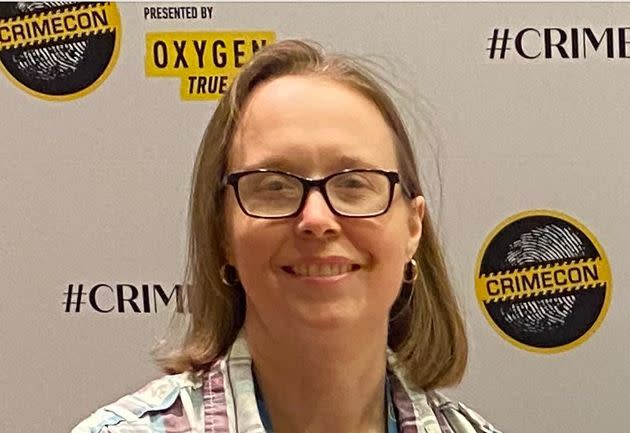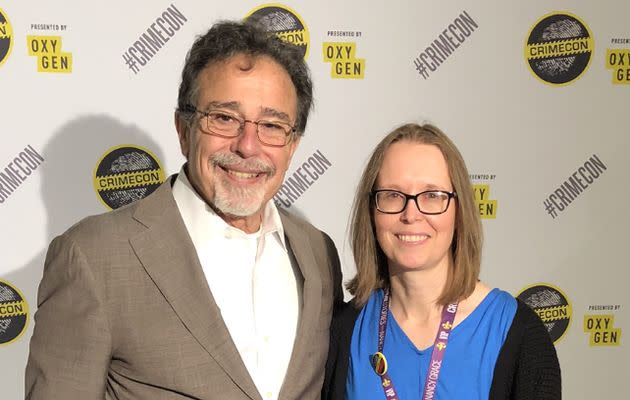True Crime Fan Funds DNA Research, Solves Case Of Man Missing For 40 Years
This is an excerpt from our true crime newsletter, Suspicious Circumstances, which sends the biggest unsolved mysteries, white-collar scandals and captivating cases straight to your inbox every week. Sign up here.
A true crime fan who used to spend weekends poring over police files and sharing theories in online message boards put up the money for private DNA testing — and actually helped solve a 40-year-old cold case.
After she donated about $7,000 to fund the investigation, Jeanne Ayotte learned last month that the remains of Francis Patrick Fitzpatrick were finally identified in August. The 43-year-old man was last seen in Springfield, Massachusetts, in 1983, but his loved ones never knew what happened to him.
Thanks to Ayotte’s donation to a private DNA laboratory that uses advanced technology and forensic genetic genealogy to identify human remains, Fitzpatrick’s son was finally able to bring his father home. The finding closes out a cold case with the Connecticut Office of the Chief Medical Examiner, which determined that the long-unidentified man died by suicide.

Jean Ayotte at CrimeCon in Las Vegas in 2022.
“Regardless of the circumstances, regardless if they’re [a] murder victim, regardless if they’re an unfortunate suicide or someone that’s unhoused and just died [in] the elements — whatever the case may be, they’re a human being … and deserve to have [their identity] restored to them,” Ayotte, a real estate paralegal, told HuffPost.
The 48-year-old Ohio resident, who is fascinated by forensics, felt like she’d hit the jackpot when she won an auction at CrimeCon, an annual true crime convention, for a “real-life private CSI tour” at Othram, a forensic DNA sequencing laboratory for law enforcement, and dinner with its CEO and co-founder, David Mittelman.
“Having heard David speak at CrimeCon” — she’s attended all five of its national in-person conventions — “I was like, no one’s going to outbid me,” Ayotte told HuffPost. “That one was mine.” She paid about $3,000 to win the tour.
Ayotte spent all day at Othram, touring its lab and meeting scientists and a genetic genealogist. The founders’ passion inspired Ayotte to make an unusual offer: “I’d love to fund a case if you’re interested in that,” she told Kristen Mittelman, Othram’s chief business development officer, who co-founded the company with her husband.
The Mittelmans took Ayotte up on her offer. Othram, which works exclusively with law enforcement (with funding from a variety of sources, including private donors like Ayotte), received the skeletal remains from the Connecticut medical examiner’s office of a long-unidentified man whose body was found in the marshlands near the Connecticut River.
Othram scientists were able to extract DNA from his bones and generate a comprehensive profile based on hundreds of thousands of data points, David Mittelman told HuffPost — a stark contrast, he claims, to the 20 DNA markers currently used by CODIS, or Combined DNA Index System, the computer software program that creates DNA profiles from convicted offenders in local, state and national databases.
Depending on the quality of the remains and the amount of genealogical research required, the company’s process can cost $5,000–$10,000. Citizen sleuths who want to help can donate money via DNASolves, an Othram website that Mittelman compares to Kickstarter. “We’re really crowdfunding among folks that are interested,” he said. “People contribute their coffee money … a bunch of people chipping in a few bucks here and there, and next thing you know, a case is solved.”

Francis Patrick Fitzpatrick in an undated photo.
Othram played a key role in identifying Karen Vergata, known as Fire Island Jane Doe, one of 11 bodies found on or near Gilgo Beach in Long Island, New York. Vergata’s remains, which were discovered in 1996, weren’t identified until after the arrest of Rex Heuermann on charges of killing three other women found on Gilgo Beach. He is believed to be a suspect in a fourth murder, and authorities are trying to determine whether he was involved in the other Gilgo Beach deaths. Mittelman confirmed to HuffPost that Othram is working to identify the remains of the other people found nearby.
While many larger law enforcement agencies — like the Gilgo Beach task force — do not need to rely on private funding, Mittelman pointed out that others do not have “strong laboratory resources” — and that more remote or rural agencies might not have a crime lab at all. Othram, he said, is “really eager to democratize this for everyone.”
Of course, despite the huge advances in DNA technology, identifying remains — and suspects in other crimes, like sexual assaults — relies on a robust database. CODIS, the national database of convicted offenders maintained by the FBI, links DNA “collected at crime scenes to other cases or to persons already convicted of or arrested for specific crimes,” but labs like Othram are strong advocates for private DNA collection, which allows them to test DNA from victims and others who might not be in CODIS.
Othram charges about $15 for a DNA swab kit, or you can upload your results from genetic testing companies like Ancestry and 23andMe.
To people who are reluctant to contribute DNA samples due to privacy reasons or concerns about misuse, Mittelman emphasized that the data Othram collects is used exclusively by law enforcement agencies to aid in human identification to solve cold cases.
Americans are divided on whether it’s appropriate for DNA testing companies to share information with law enforcement, and lawmakers across the U.S. have taken steps to both restrict and open up police use of genetic genealogy. Department of Justice policy outlines that DNA from unsolved violent crimes should only be tested against private databases where users have voluntarily provided their own samples after CODIS has produced no leads — and that law enforcement should never retain personal genetic information that’s used in an investigation.

Jeanne Ayotte poses with David Rudolf (seen in "The Staircase" defending Michael Peterson) at CrimeCon 2019 in New Orleans.
There are currently more than 23,000 open missing persons cases and nearly 30,000 unidentified or unclaimed remains in the U.S., according to the National Missing and Unidentified Persons System, a free online database of unidentified remains and missing persons records. The National Institute of Justice, a research agency within the DOJ, has referred to the backlog of cases as a “silent mass disaster.”
“This is something that burns a hole in my head,” Mittelman told HuffPost. “I think that there’s a kind of a blast radius of damage that happens when a crime like this is unresolved. It’s obviously the victim and their family and their friends, but the society at large, [including] the traumatized investigators that arrive at the scene … these people get kind of frozen in time and stuck with this case, and they can’t let it go and they pass it on to the next generation of detectives.”
“And not only are they waiting, but the family is not around forever to get the answer. [It would] be the ultimate tragedy to solve a case and then the family’s not even there to know.”
Ayotte said a frightening experience she had years ago made her mindful of just how easily families can lose someone. One night, she hitched a ride with a stranger who kept driving past her destination and refused to stop when she asked him to — and she realized there was no door handle on her side of his truck. He eventually turned around and dropped her off, but what could have happened has always stuck with her.
“I could have been sitting in a test tube at Othram, [with other people] either trying to identify who I was or who killed me, if that man intended that. It’s kind of something that always stuck in my head and made me feel very lucky and fortunate. And it kind of spurred an interest in what can I do to either stop these people from doing this, or if something unfortunate happens, get a family their loved one back?”
Since her visit to Othram, Ayotte said she has donated about $25,000 to the company. “For me, this is charitable giving. … We don’t have all the resources we need to solve crime. We don’t have all the resources we need to identify the missing and the lost. I look at it as no different than if I’m giving to the Red Cross or if I’m giving to the Salvation Army. It’s just this is the charity that I choose to do.”
Restoring Francis Patrick Fitzpatrick’s identity was exciting for Ayotte, but what she thinks of most is the man’s son.
“I just hope that whatever solving this case did, it helps him sleep at night,” Ayotte said. “Because a lot of [missing people’s loved ones] go to bed at night not knowing anything.”

 Yahoo News
Yahoo News 